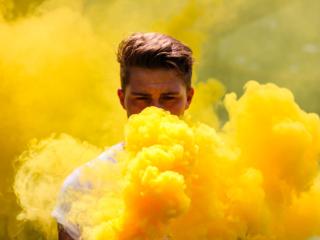An excerpt from the commencement speech David Foster Wallace gave at Kenyon College in 2005.More
Religion and Philosophy
Gül Dölen is a pioneering neuroscientist who's investigating the “critical periods” of psychedelics, including studies where she's given MDMA — also known as “Molly” — to octopuses.More
How does a lifelong atheist make sense of a mind-blowing mystical experience? That was Barbara Ehrenreich’s struggle as she wrote about an other-worldly experience when she was 17. She spoke to Steve Paulson about it in a 2014 interview about her book, "Living with a Wild God."More
Storytelling is all the rage these days — and everyone seems to have a life narrative. But not philosopher Galen Strawson. He says life stories often create an inauthentic version of ourselves.More
It's one thing to imagine the intelligence of a forest, but could you experience it? The Japanese concept of "forest bathing" might help. Forest guide Amos Clifford is a former Zen teacher who's one of the world's experts on forest bathing.More
Years ago, the philosopher David Abram was a sleight-of-hand magician who wanted to learn from the "traditional magicians" of Asia. So he apprenticed with a powerful shaman in Nepal, who seemed to have the ability to transform into a raven.More
Elizabeth Krohn says she left her body, went somewhere else, met and talked to God. And then came back to dream the future. What does her experience tell us about where religion comes from?More
What’s the most uncomfortable you’ve ever been on a trip? Anu Taranath is a social justice facilitator and teacher, used to having difficult conversations about race, identity and privilege. She says those are issues that come up all the time when Americans travel abroad.More
How do you know what’s real? Start with your senses — if you can see, touch, hear or taste something, it’s real — right? Not necessarily, according to cognitive scientist Donald Hoffman and neurologist Suzanne O’Sullivan.More
Jericho Brown is an award-winning poet who has been working with religious language for a long time. His poems have titles like "1 Corinthians 13:11" and "Hebrews 13." His book "The Tradition" continues to mine Brown's childhood in the church.More
Once you acknowledge that plants are intelligent and sentient beings, moral questions quickly follow. Should they have rights? How can we think of plants as "persons"? Plant scientist Matt Hall sorts out these ideas with Steve.More
Pamela Smith's science history students spend a semester taking medieval alchemical recipes and re-creating them in a lab.More
Alchemists believed that if they could transform matter, why not also the spirit, or the self? That last part is what’s attracting new followers today, like Sara Durn.More
Andrew Newberg is a pioneer in neurotheology. He says brain scans can show the neural signature of spiritual experience.More
Jeff Schloss is an evolutionary biologist. He’s also Christian. As a scientist, he’s trying to develop an evolutionary theory for the origins of religion. But he says science can’t explain everything about religion.More
Ancient humans lived as hunter-gatherers, with animistic religions. So why did people start to believe in Big Gods? University of British Columbia psychologist Ara Norenzayan has a theory. More
African chimps store caches of big rocks to throw at certain trees. And some scientists wonder, are those trees sacred to them?More
Hope can seem saccharine. Bland. Trite. But talking about hope with Andre Willis, a philosopher of religion, might make you realize you're not thinking big enough when you think about what hope means.More


















